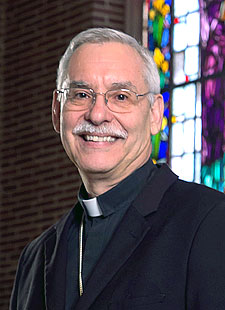Official Website of the
Catholic Diocese of Little Rock
Catholics should learn, discern and vote
Published: February 27, 2020
Watch Faithful Citizenship Videos
Click on the button above to watch the five new videos in four languages produced by the U.S. Conference of Catholic Bishops to help Catholics understand the Church's social teachings and discern how best to vote. The Arkansas primary elections will be March 3.
Bishop Anthony B. Taylor addressed a letter to the people of the Diocese of Little Rock, Monday, Feb. 24, about the updated version of the document: “Forming Consciences for Faithful Citizenship: A Call to Political Responsibility,” by the U.S. bishops, "to help us better live our faith in the public square." Five new videos, in four languages, have been produced to help Catholics better understand the 53-page document.
In addition, the bishops recently launched the "Civilize It: Dignity Beyond the Debate" campaign asking Catholics "to pledge civility, clarity and compassion in their families, communities and parishes, and call on others to do so as well." The Civilize It website explains: "Civilize It is a non-partisan call to focus on the dignity of all people, even when we disagree, and to put faith in action by bearing witness to a better way forward."
 Bishop Taylor wrote his letter in advance of the Arkansas primary elections March 3. "'Forming Consciences for Faithful Citizenship' recognizes that we live in an imperfect world and emphasizes the need for a well-formed conscience, the virtue of prudence, the obligation to do good and avoid evil, and the need to make moral choices," he wrote.
Bishop Taylor wrote his letter in advance of the Arkansas primary elections March 3. "'Forming Consciences for Faithful Citizenship' recognizes that we live in an imperfect world and emphasizes the need for a well-formed conscience, the virtue of prudence, the obligation to do good and avoid evil, and the need to make moral choices," he wrote.
"It goes on to describe the main principles of Catholic social teaching and then to apply these to 13 of the major issues of the day, including human life (especially abortion), promoting peace, marriage and family life, the preferential option for the poor, migration, promoting justice, combatting unjust discrimination, care for our common home and global solidarity. This is a lot to digest, but it is easy to see that most of these issues fall into one of two categories: pro-life and/or pro-social justice."
"The dilemma for American Catholics is that both of our two principal political parties advocate policies that are the opposite of what we believe as Catholics. Indeed, many of us feel split down the middle and have a hard time voting in good conscience. And yet as faithful citizens, we have an obligation to participate fully in the life of our country, and so outside of the extraordinary situation where all candidates are promoting intrinsically evil acts, simply not voting would be an abdication of this responsibility."
"As bishop I cannot endorse or oppose any political party or candidate, but I do have an obligation to help you form your conscience and choose wisely — even to the point of thinking outside the box. For instance, you might do an Internet search to see whether you might find a third party which you can support and even promote, a party whose candidates better represent your views as a faithful Catholic, both pro-life and pro-social justice. In any event, I encourage you to examine the views of each candidate rather than just those of their political party and study the office a candidate is seeking in order to assess how much it may influence the issues of greatest moral concern."
"Let us remember that as Catholics we do not leave our faith behind when we interact with others in the secular world — quite the contrary, we have much to contribute. The purpose of this letter is to alert you to these resources for forming your conscience and to remind you to draw on your faith as you exercise your responsibilities as a citizen."
Download the bishop's letter in English or Spanish. Find bulletin inserts, prayers, Q&A, lesson plans, information about how to contact elected officials and more in English and Spanish on the USCCB website. Or read Arkansas Catholic to learn more.




